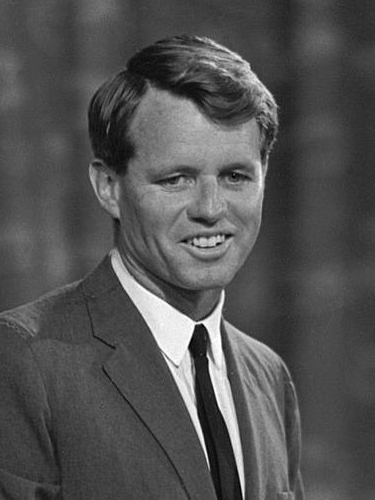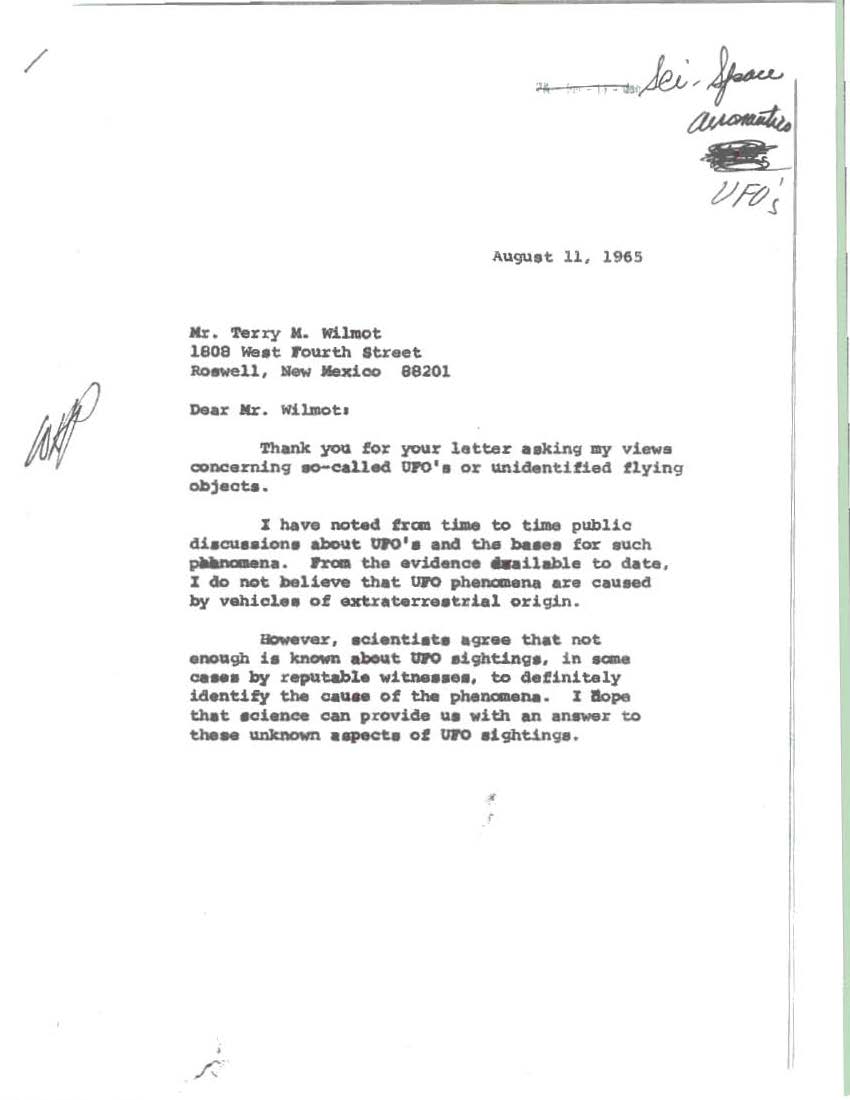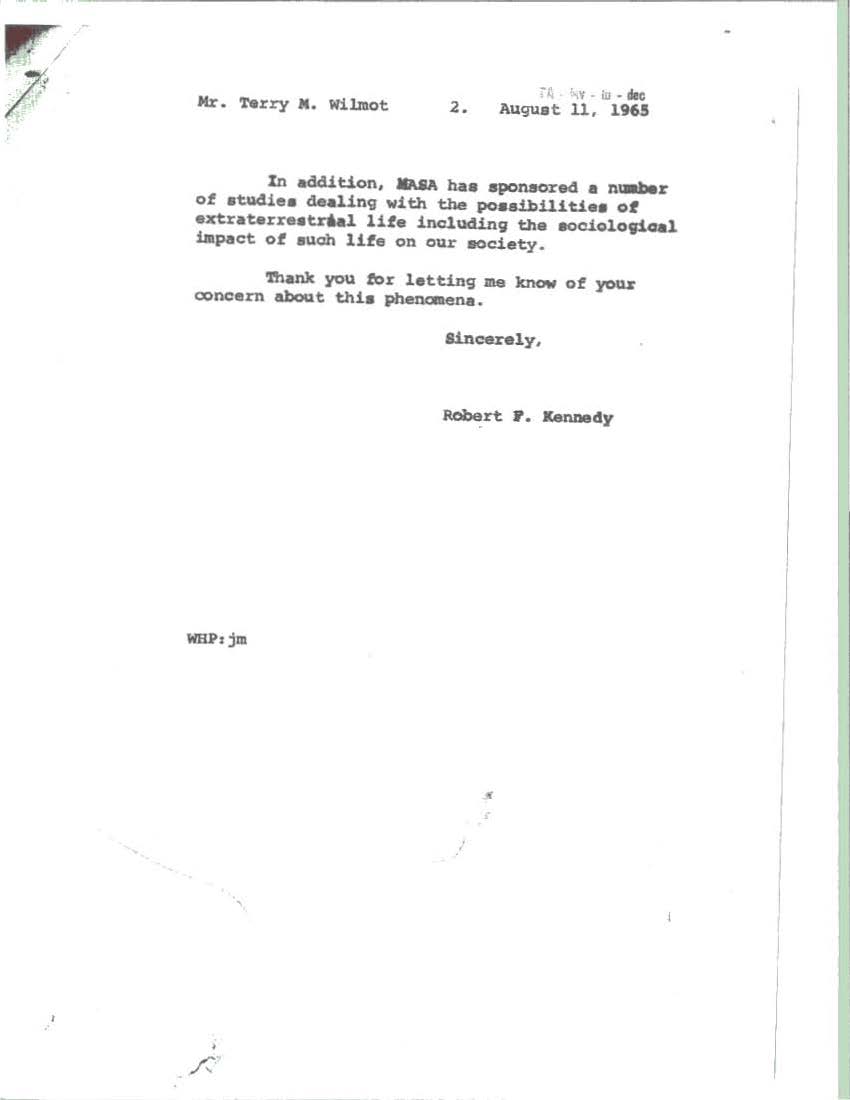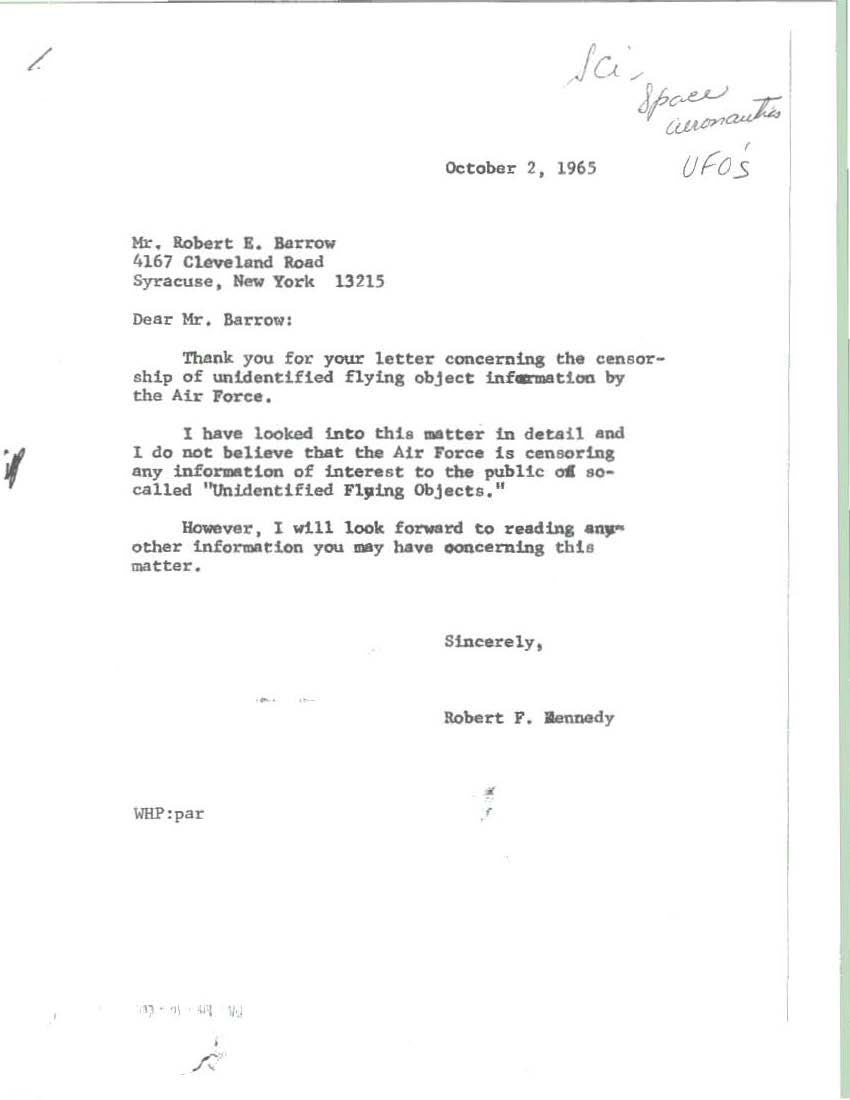Robert
Francis Kennedy (November 20, 1925 – June 6, 1968),
commonly known as "Bobby" or by his initials
RFK, was an American politician, who served as a Senator
for New York from 1965 until his assassination in 1968.
He was previously the 64th U.S. Attorney General from
1961 to 1964, serving under his older brother, President
John F. Kennedy and his successor, President Lyndon B.
Johnson. An icon of modern American liberalism and member
of the Democratic Party, Kennedy was a leading candidate
for the Democratic presidential nomination in the 1968
election.

Kennedy
appearing before the Platform Committee, 1964
After
service in the U.S. Naval Reserve as a Seaman Apprentice
from 1944 to 1946, Kennedy graduated from Harvard College
and the University of Virginia School of Law. Prior to
entering public office, he worked as a correspondent to
the Boston Post and as an attorney in Washington D.C..
He gained national attention as the chief counsel of the
Senate Labor Rackets Committee from 1957 to 1959, where
he publicly challenged Teamsters President Jimmy Hoffa
over the corrupt practices of the union, and published
The Enemy Within, a book about corruption in organized
labor.
A
prominent member of the Kennedy family, Bobby was the
campaign manager for his brother Jack in the 1960 presidential
election and was appointed Attorney General during his
presidential administration. He also served as a White
House adviser to the president from 1961 to 1963. His
tenure is best known for its advocacy for the African-American
Civil Rights Movement, crusade against organized crime
and the mafia, and diplomacy during the Berlin Crisis
of 1961. After his brother's assassination, Kennedy left
the Johnson administration to run for the United States
Senate in 1964, defeating Republican incumbent Kenneth
Keating.
In
1968, Kennedy campaigned for the presidency and was a
leading Democratic candidate, appealing particularly to
black, Hispanic, and Catholic voters. Shortly after midnight
on June 5, 1968, after Kennedy defeated Senator Eugene
McCarthy in the California presidential primary, he was
shot by Sirhan Sirhan and died the following day.
Robert
Kennedy and UFOs
In
a recently rediscovered videotaped interview with Col.
Philip J. Corso done by Maurizio Baiata in Rome in July
1997, the colonel reveals that he had personally briefed
Attorney General Robert F. Kennedy in the early sixties
about the results of his top secret work of bringing pieces
of the Roswell UFO crash to selected companies in the
military industrial complex for developing and adapting
the alien technology.
Between
1961 and 1963, Lt. Colonel Philip Corso
was at the Pentagon as special assistant to Lt. General
Arthur Trudeau, head of Army Research and Development.
During that time, Corso also served as head of the U.S.
Army’s newly established Foreign Technology Desk.
During
the Eisenhower administration, Corso also served in a
number of National Security Council committees as the
Army Liaison, reporting directly to Lt. General Arthur
Trudeau, who was then head of U.S. Army Intelligence.
In
the interview, originally recorded in 1997 before his
death, Corso explains that Robert Kennedy contacted him
because of his intimate knowledge of highly classified
national security information regarding UFOs, and according
to his testimony, President John F. Kennedy’s inevitably
had knowledge of the secret alien-UFO presence.
"I
discussed this very thoroughly with Bobby Kennedy, the
attorney general, the President’s brother… He
knew about the flying saucers; I talked to him about it.
I used to meet him when he was attorney general right
in his office… What went to Bobby went to the President
also."
Corso’s
revelations about briefing Robert Kennedy on UFOs suggests
that the Kennedy brothers were sufficiently informed about
extraterrestrial life and technology, to pose a direct
challenge to those managing extraterrestrial affairs.
The ensuing struggle between the Kennedy brothers and
the controllers of UFO/extraterrestrial information was
a very high stakes affair. While Robert Kennedy may have
been involved in the silencing/assassination of Marilyn
Monroe over her threats to blow the whistle on the President’s
secret visit to see a downed UFO and alien bodies, Robert
Kennedy may himself have been ultimately assassinated
due to his UFO knowledge. The 1968 assassination of then
Senator Robert Kennedy put a final end to the Kennedy
brothers efforts to restore direct Presidential control
over extraterrestrial life and technology.
As
President Kennedy’s younger brother, Bobby Kennedy
was not only the Attorney General but also JFK’s
most trusted advisor. A year after JFK’s assassination,
he was elected Senator for the state of New York in November
1964, where he soon became a prominent political figure
because of his charisma and the Kennedy name. He probably
would have become the next president of the United States,
had he not been murdered during the celebration of his
victory of the California primary at The Ambassador Hotel
in Los Angeles, just after midnight on June 5, 1968.
John
Greenwald of www.blackvault.com
obtained a dossier of 127 pages
from the Kennedy presidential library which gives a far
more complete picture of the NY senator’s involvement
with UFOs. The letters cover a period between 1965 and
1968 and contain 39 letters signed by Kennedy himself,
plus the original letters he received from a number of
constituents and UFO researchers, U.S. Air Force statements,
some newspaper clippings, etc.
You
can download the entire Bobby Kennedy UFO file here.
The
period of 1965 and 1966 was the most active in Bobby Kennedy’s
UFO correspondence. This coincided with a lobbying effort
by the National Investigation Committee on Aerial Phenomena
(NICAP) to have Congressional hearings on UFOs. NICAP
was then the nation’s most influential UFO group
led by the late Major (Ret.) Donald Keyhoe in the Washington,
DC area. Out of the 27 individuals who wrote to Kennedy,
most belonged to NICAP and some, like Robert Barrow, Raymond
Konley and Ralph Rankow, wrote several letters to him.
Back
in the 1960s, form letters had not been developed to the
exact science than they are today, so Bobby Kennedy’s
letters vary a little from one to the other, but some
general themes nevertheless emerge clearly. He is of course
a polished politician, always polite to his constituents,
thanking them "for your thoughtful letter,"
appreciating them for "your thoughtfulness in
writing to me on this matter," and so on. He
then tries to walk a thin line between appearing open
minded enough while at the same time making it clear that,
"from the evidence available to date, I do not
believe that UFO phenomena are caused by vehicles of extraterrestrial
origin." Here is a typical response, in this
case to Terry Wilmot of Roswell, NM, dated April 11, 1965:


Despite
his mild skepticism, Kennedy hedges his bet by admitting
that "scientists agree that not enough is known
about UFO sightings, in some cases by reputable witnesses"
and that, "I hope that science provides us with
an answer to these unknown aspects of UFO sightings."
There can be little doubt that when it came to the allegation
that the Air Force was covering-up some UFO evidence,
an issue raised often by the NICAP members like Ralph
Rankow and others, Kennedy rejected it. Here is his response
to one of Robert Barrow’s letters, where he writes,
"I do not believe that the Air Force is censoring
any information of interest to the public of so-called
'Unidentified Flying Objects'."

In
some cases, Kennedy attached Pentagon form letters with
the standard line of "the Air Force does not withhold
or censor any information on UFO's." In many
of the letters, he mentioned Dr. Harlow Shapley, who was
a then well known Harvard astronomer and author. For instance,
in a letter to Anne Epple of New York City, dated September
10, 1966, Kennedy wrote that, "Dr. Harlow Shapley,
for one, has stated that there is a high probability that
there is other life in the universe." But then
Kennedy lowers the tone, adding that "to believe
that there is other life in the universe is not, however,
to believe that 'UFO’s' are manned vehicles."
He then adds a debunking line (which appears in several
of the letters) that "one explanation of this
phenomenon…connects the lights that are seen with
the gaseous tails of comets."
As
time went by, Bobby Kennedy was able to deflect the issue
by referring people to the University of Colorado’s
Scientific Study of UFOs led by physicist Dr. Edward U.
Condon, which had been contracted by the USAF to conduct
a supposedly independent and thorough study of the matter,
later known as the Condon Report. That is basically the
gist of the Bobby Kennedy UFO file. Generally speaking,
many of the letters sent to the senator are more interesting
than his responses. Author John Keel, for instance, wrote
a long letter dated January 19, 1966. "I have
been collecting information about UFOs since the appearance
of the mysterious ‘Foo fighters’ in World War
II," wrote Keel. "But I did not fully
believe in their existence until 1954 when I actually
saw a ‘Flying Saucer’ maneuvering over the Aswan
Dam in Egypt. It was hovering at a low altitude and was
obviously a solid metal object, circular with a dome on
top. After a few minutes the outer rim started to revolve
rapidly and it moved off at very high speed. Similar objects…or
the same one…were later reported over other areas
of the Middle East." As far as I can remember,
Keel never wrote about this sighting in his books or articles,
but there it is. He then goes on to criticize the Air
Force’s incompetence on this issue, but basically
received the Bobby Kennedy "form letter" with
Dr. Shipley, the "gaseous tails of comets"
and the final "appreciate hearing from you on
this matter."
Sources:
http://en.wikipedia.org/wiki/Robert_F._Kennedy
http://www.openminds.tv/bobby-kennedy-and-ufos/
http://consciouslifenews.com/video-robert-kennedy-jfk-knew-ufo-secrets/
http://www.examiner.com/article/secret-kennedy-extraterrestrial-briefing-strengthens-ufo-assassination-theories
